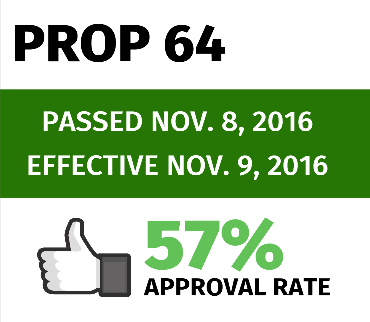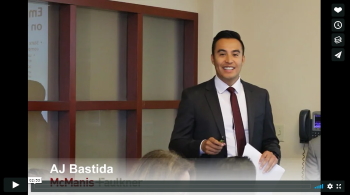Proposition 64 changed marijuana laws. What many do not realize is that it did not change employment laws. Employers recognize societal norms are changing with the passing of Prop 64. A new era has commenced and the Family Medical Leave Act (FMLA) and Americans with Disabilities Act (ADA) will play a large role in how cannabis is handled in the workforce.
Quick Recap of Prop 64
 In 1996, California became the first state to legalize medical cannabis with the approval of Proposition 215. In 2016, California became one of the few states also to legalize recreational cannabis with the approval of Proposition 64. This proposition passed with a 57% approval rating on November 8, 2016, and became effective November 9, 2016. Proposition 64 changed individual, commercial, and regulatory laws regarding cannabis. Most notably it legalized the recreational use of cannabis by persons 21 years of age and older.
In 1996, California became the first state to legalize medical cannabis with the approval of Proposition 215. In 2016, California became one of the few states also to legalize recreational cannabis with the approval of Proposition 64. This proposition passed with a 57% approval rating on November 8, 2016, and became effective November 9, 2016. Proposition 64 changed individual, commercial, and regulatory laws regarding cannabis. Most notably it legalized the recreational use of cannabis by persons 21 years of age and older.
However, by its own language, Proposition 64 does not:
- Change the rights and obligations of employers to maintain a drug and alcohol free workplace;
- Require an employer to permit or accommodate the use, consumption, possession, transfer, display, transportation, sale, or growth of cannabis in the workplace;
- Affect the ability of employers to have policies prohibiting the use of cannabis; and
- Prevent employers from complying with state or federal law.
Real World Complications: FMLA
The FMLA allows eligible employees up to 12 weeks of unpaid leave for treatment of a serious health condition. It provides various definitions of what constitutes a serious health condition. In certain circumstances, an incapacity of more than 3 consecutive calendar days and an in-person visit with a medical provider who administers a regimen of continuing treatment, such as prescription medication, would be considered a serious health condition. This is important because there is an increase in medical marijuana prescriptions, but also—in this post-Prop 64 world—an increase in the use of recreational marijuana as “self-medication.” Employers are encountering more employees on leave using marijuana—whether prescribed or not.
In practice, employers must be aware that under the FMLA, even for an employee using marijuana during his or her FMLA leave (regardless of whether it is prescribed as part of the treatment for the employee’s serious health condition), the employer must accommodate and grant FMLA leave for the underlying serious health condition.
More Real World Complications: ADA
The ADA requires employers to make reasonable accommodations for qualified workers with disabilities. There are more and more medical conditions that qualify as disabilities under the ADA for which physicians have begun prescribing medical marijuana as a treatment.
Under Federal Law
- The ADA does not protect illegal drug use;
- Marijuana is illegal—it remains a Schedule 1 illegal substance; and
- The ADA provides no exception for medicinal use of Marijuana.
This means that the ADA only protects drug treatments prescribed by health care professionals when those drugs are not explicitly banned by the federal Controlled Substances Act.
Again, in practice, employers must be cautious. Although illegal drug use is not protected under the ADA, an employer’s obligation to accommodate a qualified worker with a disability remains in place. While an employer may act adversely against an employee for his or her illegal drug use (not protected under the ADA), the employer may not subject the employee to an adverse action because of the underlying disability. Employers who fail clearly to distinguish these two scenarios may find themselves in litigation with one side arguing it has the right to enforce a drug-free workplace, and the other arguing the employer’s enforcement of its drug-free policy was merely a pretext to discriminate against his or her disability.
Ultimately, although marijuana is both legal (under state law) and illegal (under federal law), it does not change employment law, but it should change employment practices. Employers are well advised to review their policies and consult counsel on a case-by-case basis.
For related vlog click here



